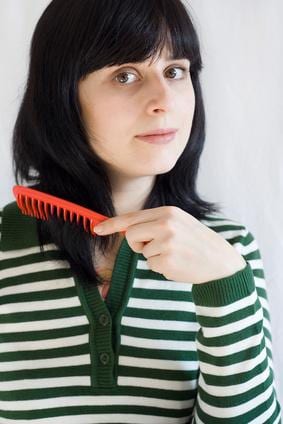According to the American Hair Loss Association, nearly half the people suffering from hair loss are women. Unlike male pattern balding in which hair loss is almost always genetic, the causes for female pattern hair loss are numerous. Genetics, stress, pregnancy and childbirth, poor nutrition, hormonal imbalances, the use of certain medications and too-tight hairstyles can all contribute to hair loss. Fortunately, there are hair-loss treatments that encourage regrowth.
Topical Treatments
An increase in dihydrotestosterone, a testosterone derivative, is a common culprit of female pattern hair loss. Large amounts of dihydrotestosterone can cause hair follicles to shrink, resulting in overall thinning of the hair. Ovarian cysts, certain birth control pills, pregnancy and menopause–anything that disrupts your body’s balance of hormones–can cause your hair to fall out. Doctors are reluctant to prescribe oral treatments for female pattern hair loss, and topical treatments are more commonly used. Minoxadil 2 percent is the only topical drug approved by the Food and Drug Administration. Minoxadil 2 percent was first used orally to treat high blood pressure, and doctors discovered that excessive hair growth was a side effect of the drug. It’s now available as a topical form you apply directly to the scalp. Nizoral 1 percent is an over-the-counter anti-fungal shampoo used to control dandruff. A slightly more effective Nizoral 2 percent is available through physician prescription, but both help control hair loss and promote new growth. Anthralin is a tarry substance doctors prescribe for psoriasis, but for which hair growth is a side effect. Topical treatments work best at the onset of thinning hair.
Oral Medications
Androgens are the group of hormones primarily associated with the male reproductive system and the production of testosterone. Androgens are present in females, though in very low amounts. Low-androgen index birth control pills decrease the production of androgens in women, thereby controlling hair loss. Cimetidine is an oral medication sold under the brand name Tagamet that is used to reduce the production of stomach acid, but it’s been shown to control hair loss in women. Though the FDA approved Propecia for the regrowth of men’s hair, it has not been approved for women as of 2010. Despite some women finding it an effective treatment, women of childbearing age should not use Propecia or even handle it, as it can cause severe birth defects in male fetuses. Spironolactone, known by the brand name Aldactone, is a diuretic that slows down the production of androgen and also blocks dihydrotestosterone from binding to its androgenetic receptor. The most common treatment for women in menopause who are experiencing hair loss is a combination of estrogen and progesterone, also known as hormone replacement therapy.
Corticosteroids
Alopecia areata, an auto-immune disorder that causes hair loss, is an incurable condition. However, it can be controlled with the use of corticosteroids. Corticosteroids are anti-inflammatory drugs that prevent the immune system from attacking itself. These drugs are available in injection, pill or cream form, though they are not widely used because of the potential for adverse side effects.
Laser Combs
A laser comb is a device that uses phototherapy to stimulate new hair growth when waved over the head. Though the FDA approved its use for men, Dr. Robert Bernstein, associate clinical professor of dermatology at Columbia University, believes it might actually work better for women. However, there is still debate about its general effectiveness.





